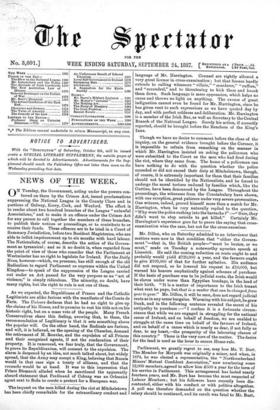Mr. Dillon, who on Saturday admitted to an interviewer that
matters were now in that condition that "either the Govern- ment "—that is, the British people—" must be beaten, or we must," made on Tuesday a noteworthy agrarian speech at Limerick. He said the coming reduction on rents ought to and probably would yield £720,000 a year, and the farmers ought to give £100,000 of that for further agitation. His audience did not respond, so he lowered his request to £10,000, but warned his bearers emphatically against schemes of purchase. If the basis of purchase was to be judicial rents, the Irish would be slaves under worse than Egyptian bondage, in the land of their birth. "It is a matter of importance to the Irish tenant what rent be pays, but that is a matter that can be changed Irons year to year." Mr. Dillon, it will be seen, does not regard judicial rents as in any sense bargains. Warming with his subject, he grew frank, and in the following sentence revealed the secret of his antipathy to purchase I confess it is a fortunate circum- stance that while we are engaged in struggling for the national cause of Ireland, and on behalf of freedom, we are enabled to struggle at the same time on behalf of the farmers of Ireland, and on behalf of a cause which is nearly as dear, if not fully as dear, to my heark—the prosperity of the labouring classes of this country." There is the very core of the matter. The desire for the land is used as the lever to secure Home-rule.


































